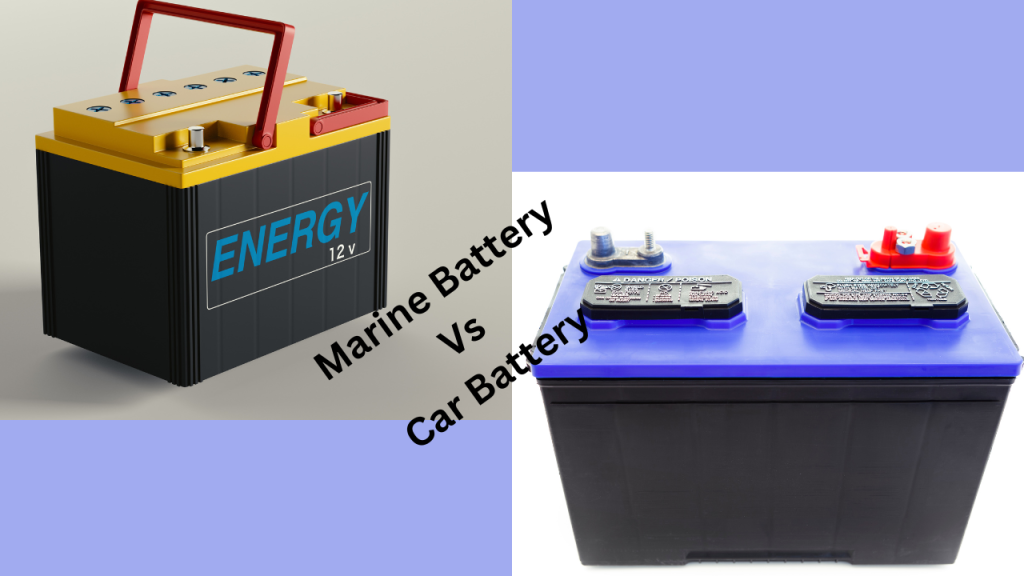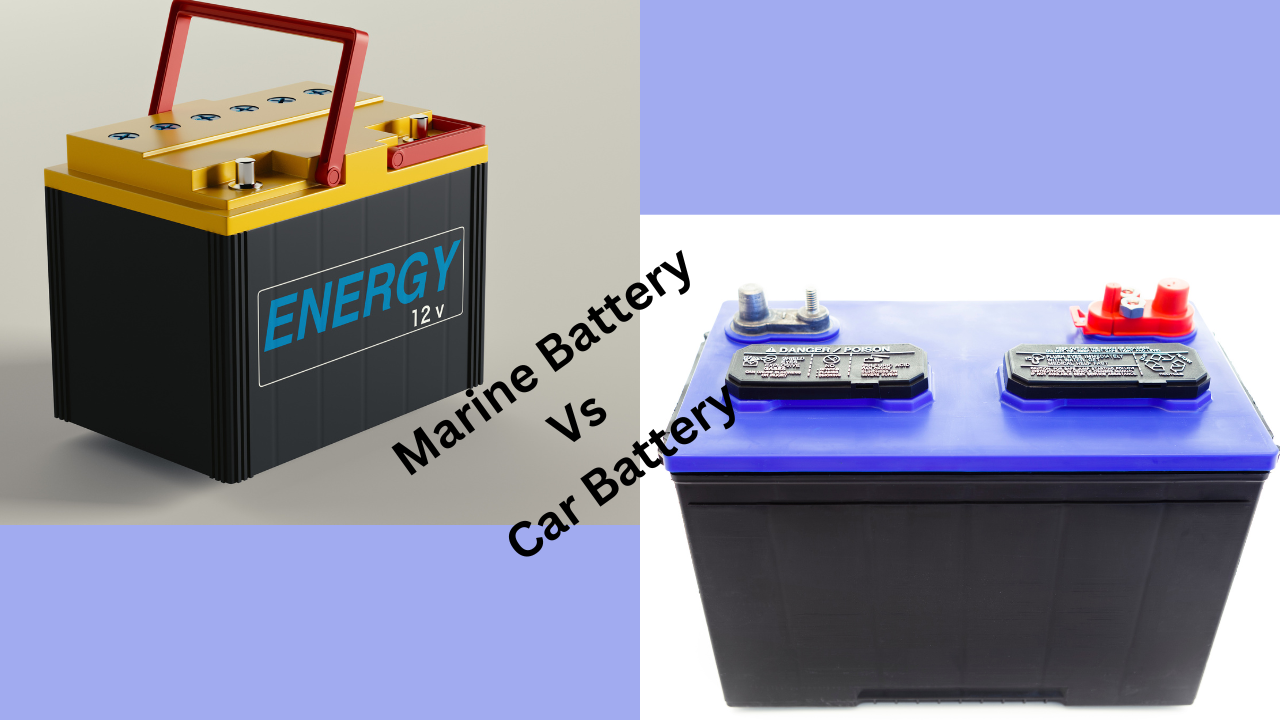Marine batteries are designed for prolonged deep discharges and harsh marine environments, while car batteries are built for short, high-current bursts to start engines. Marine batteries cope better with vibrations and moist conditions than car batteries.
Understanding the distinctions between automobile and marine batteries is crucial for optimal application performance and safety. Car or starting batteries deliver quick, powerful surges to crank an engine and are not intended for long-term energy discharge.
On the other hand, marine batteries must endure the rigours of the boating world, including constant bouncing and water exposure. These batteries are often dual-purpose, offering enough cranking power to start boat engines and sustaining enough reserve capacity to power electronics.
Ensuring the correct battery for each context extends the battery’s lifespan and enhances the reliability of your vehicle or vessel. Selecting the right battery type can prevent having a dead battery and being stuck in scenarios where reliability is not just a matter of convenience but safety.
Introduction To Battery Basics
Welcome to the fundamental world of batteries, where we uncover the power sources crucial for both land and water vehicles. Batteries are the silent heroes, yet their complexity and importance are often overlooked.
Let’s explore the essentials of batteries, their functions, and why choosing the right one makes a difference.
Understanding Battery Fundamentals
Batteries store energy in chemical form and convert it into electrical power when needed. This energy ignites engines, powers lights, and supports critical electronics. Two main components, the anode and cathode, interact with an electrolyte to enable this energy conversion.
- Voltage measures electrical pressure.
- Ampere, or current, is the flow rate of electricity.
- Amp-hour (Ah) signifies a battery’s storage capacity.
Batteries come in various types and sizes. They suit different applications based on capacity, durability, and discharge rates. Keep these factors in mind to ensure optimal performance and longevity.
Purpose And Role Of Batteries In Vehicles And Marine Vessels
Car and marine batteries power many essential functions. In vehicles, they start engines, light up the dashboard, and activate sound systems. Boat batteries start engines and provide energy for trolling motors and onboard accessories.
| Feature | Car Battery | Marine Battery |
|---|---|---|
| Energy Demand | High initial burst | Steady, long-term supply |
| Vibration Resistance | Lower | Higher |
| Discharge Rate | Shallow | Deep |
Durability in marine batteries is critical due to harsh sea conditions. They are built to withstand deep discharge cycles. On the other hand, car batteries need to deliver a robust and quick discharge to start the engine, followed by constant recharging from the alternator.
Selecting the right battery for your vehicle or vessel requires insight into their roles. Compatibility and efficiency are key to ensuring a seamless journey, whether you are hitting the road or sailing the seas.
Comparing Marine And Car Batteries
Boats and cars both need batteries, but they are not the same. It is essential to know how marine and car batteries differ. This will help you choose the correct battery for your vehicle.
Physical Structure And Design Differences
Marine and car batteries look similar but have different designs for different uses. Let’s explore these differences.
- Marine batteries can handle shaking from waves.
- They often come in a dual-purpose design.
- Car batteries are built for a quick energy burst.
Chemical Composition And Energy Storage
The type of chemicals inside a battery affects how it stores energy. This section explains these chemicals.
| Marine Battery | Car Battery |
|---|---|
| Deep cycle design | Lead-acid |
| Discharges energy slowly | Delivers quick energy |
Power Demands And Discharge Cycles
Different vehicles need different amounts of power. Batteries must match vehicle power needs.
- Marine batteries release power over a long time.
- They recharge many times.
- Car batteries give lots of power quickly.
- They are not for slow, extended use.
Specific Requirements For Marine And Car Batteries
Batteries power our journeys, whether by land or sea. But choosing the right one is critical. Marine and automotive batteries may look similar. Yet, they serve different purposes. Each has specific needs based on how and where they operate. Let’s dive into what sets them apart.
Vibration Resistance And Durability
Life on the water is rough. Marine batteries must endure constant movement. High vibration resistance is critical. They use thicker plates and robust construction. These prevent damage from the waves.
Cars have smoother rides but still face bumps. Car batteries are durable, but marine versions take toughness further. They are built to last against the rocking motions of a boat.
Corrosion Resistance And Maintenance Needs
Saltwater is a battery’s foe. Marine batteries fight back with corrosion resistance. Special coatings and materials keep them safe. They can be maintenance-free or low-maintenance.
Car batteries need care, too. Clean terminals and top-up fluids are routine. Yet, the stress of the marine environment demands more from boat batteries. They’re designed to withstand more for longer.
Temperature And Environmental Adaptations
Temperatures affect performance. Marine batteries power through various climates. They’re made to handle extreme cold and heat without power loss.
Car batteries also adapt to temperature changes. But marine batteries stand out. They offer consistent power in environments ranging from blazing sun to icy waters. Durability in diverse conditions is guaranteed.

Credit: www.media.stellantis.com
Applications And Performance Expectations
When navigating the waters of battery purchase, it’s crucial to understand the distinction between automotive and marine batteries. These power sources play distinct roles tailored to their environments. Let’s dive into how each battery type excels in its domain.
Typical Usage Scenarios For Marine Batteries
Marine batteries power up unique settings. They are not like regular car batteries. Boats and watercraft rely on them. Often, they multitask — starting engines and running accessories.
- Deep-cycle marine batteries: They handle devices like fish finders and trolling motors.
- Starting batteries: Quick bursts of power start boat engines.
- Dual-purpose batteries: Perfect for boaters wanting one battery for all tasks.
Everyday Car Battery Applications And Load Characteristics
Beneath the hood of every car is a battery engineered for road demands. Car batteries master quick engine starts and run essential systems.
- Starting, Lighting, and Ignition (SLI): SLI batteries keep cars and small vehicles running smoothly.
- High load capacities: Modern vehicles come with tech features that demand a lot from batteries.
- Quick recovery: Car batteries recharge faster after the engine starts, unlike deep-cycle batteries.
Longevity And Lifespan In Different Settings
| Battery Type | Typical Lifespan |
|---|---|
| Marine Battery | 1-6 years |
| Car Battery | 3-5 years |
Different settings affect battery life. Vibration and weather hit marine batteries hard. They need heavy-duty builds. Car batteries face less harsh conditions. Yet, non-stop use wears them out too.
- Regular maintenance boosts longevity for any battery.
- Optimal usage: Stick to recommended applications to prevent premature battery death.
- Quality matters: High-quality batteries resist wear and maintain a charge longer.
Safety Considerations And Best Practices
Ensuring safety in the use of marine and car batteries is crucial. This section explores the best practices to maintain during handling, installation, and emergencies. Whether for leisurely boating or daily driving, understanding the risks and how to manage them effectively is critical.
Marine Battery Safety: Risks And Precautions
To maintain safety, note the following for marine batteries:
- Wear protective gear, like gloves and goggles.
- Ensure proper ventilation to prevent gas buildup.
- Keep batteries secure to avoid movement at sea.
- Avoid open flames or sparks near the battery.
- Regularly check for corrosion and clean terminals.
Car Battery Handling And Installation Guidelines
Adhere to these guidelines during car battery installation:
- Turn off the vehicle before starting.
- Disconnect the negative cable first to prevent shorts.
- Remove the old battery and lift it straight out by the handle.
- Place the new battery in the holder and secure it tightly.
- Connect the positive cable first, then the negative.
Emergency Protocols And Troubleshooting Tips
Follow these tips in an emergency:
| Issue | Troubleshooting Tip |
|---|---|
| Battery not charging | Check connections and look for visible damage. |
| Power loss at sea | Carry a spare marine battery and know how to swap it. |
| Leakage or damage | Isolate the battery and seek professional help. |
Making The Right Choice: Selecting A Battery For Your Needs
Choosing the right battery is crucial for your vehicle or boat. Car batteries and marine batteries serve different purposes. It’s important to understand these differences. This will help ensure you select a reliable battery that fits your specific needs.
Assessing The Right Type For Your Vehicle Or Vessel
- Marine Battery: Ideal for boats; handles deep discharge cycles.
- Car Battery: Made for cars; provides high initial power for engine starting.
Think about the demands of your equipment. A car battery might fail in a boat where consistent power delivery is critical. Likewise, a marine battery in a car might not offer the best performance due to its design focus on deep discharge rather than the quick, high-power output necessary for starting a vehicle.
Cost Comparison And Value Assessment
Batteries come at various prices. The choice isn’t just about upfront costs. Consider the long-term value as well.
| Type | Average Cost | Life Expectancy |
|---|---|---|
| Marine Battery | $100 – $300 | 4 – 6 years |
| Car Battery | $50 – $120 | 3 – 5 years |
Think of the lifespan and what your vehicle goes through. Sometimes, a higher initial cost gives you more reliable performance and fewer replacements over time.
Future Trends And Advancements In Battery Technology
Technology is always changing. Stay up to date with future trends in battery technology. This could impact your decision.
- Lithium-Ion: Gaining popularity for its long life and efficiency.
- Intelligent Batteries: They can communicate with devices to improve performance.
- Recycling Programs: Batteries are being recycled more, which can lower costs.
New technologies might make some batteries better for different uses. Keep an eye on these trends. They will guide you to make a more informed choice that benefits you in the long term.
Conclusion: Understanding The Importance Of Battery Selection
Choosing the correct battery for your vehicle or vessel is vital. Not only does it ensure optimal performance, but it also guarantees safety. In this concluding section, we delve into why picking the correct battery type can make all the difference.
Recap Of Key Differences Between Marine And Car Batteries
- Marine batteries resist deep discharge cycles.
- The build supports vibration resistance in rough waters.
- Car batteries offer high-cranking power for quick starts.
- They’re designed for short, high-energy bursts.
The Impact Of Choosing The Right Battery On Performance And Safety
Using a marine battery in a boat prevents power loss at sea. A car battery ensures quick starts on the road. Matching the battery to the vehicle avoids potential hazards and keeps the system running smoothly.
Final Thoughts And Recommendations For Users
Be mindful of your vehicle’s needs. Always refer to the manufacturer’s guide when selecting a battery. Opt for quality brands that offer warranty and reliability. Remember, the correct battery keeps you safe and your vehicle in prime condition.

Deep Cycle Marine Battery Vs Car Battery
Deep-cycle marine and car batteries are lead-acid batteries, but they are designed for different purposes and have distinct characteristics.
Deep Cycle Marine Battery:
- Design:
- Designed to deliver a consistent power output for an extended period.
- Constructed with thicker plates, allowing for deeper discharges and longer life cycles.
- Usage:
- It is ideal for applications that demand constant electricity for extended periods, such as trolling motors on boats, RVs, and other marine applications.
- SuiteIt is suited to situations where the battery is regularly profoundly discharged and recharged.
- Discharge Depth:
- Can handle deeper discharges without significant damage to the battery.
- Life Cycle:
- Generally, it has more life cycles than car batteries when discharged deeply and recharged correctly.
- Performance:
- Provides a stable and continuous power supply for appliances and equipment on boats and RVs.
Car Battery:
- Design:
- It is designed for short bursts of high power to start the engine.
- It has thinner plates compared to deep-cycle batteries.
- Usage:
- They are primarily used to start the engine and power the vehicle’s electrical systems.
- It is not designed for deep discharges; frequent deep discharges can significantly shorten the lifespan.
- Discharge Depth:
- Sensitive to deep discharges; repeated deep cycling can damage a car battery.
- Life Cycle:
- Generally, it has a lower number of life cycles compared to deep-cycle batteries.
- Performance:
- It quickly provides a high amount of current, making it suitable for the high power demands of starting a car.
In summary, if you need a battery for marine applications that require sustained, continuous power, a deep-cycle marine battery is the better choice.
If you need a battery for a vehicle to start the engine and power short-term electrical needs, a car battery is the appropriate option. Choosing the right kind of battery for your particular use is crucial to guarantee life and optimum performance.
Frequently Asked Questions On Marine Battery Vs Car Battery
Can You Swap Marine And Car Batteries?
No, marine and car batteries serve different purposes and aren’t interchangeable. Marine batteries are made to last longer than car batteries and are intended to give engines a fast power boost. They must often support deep-cycle operations for extended periods, such as powering electronic equipment on a boat.
What Makes Marine Batteries Unique?
Marine batteries are built to endure harsh environmental conditions, with thicker plates and sturdier construction than car batteries. They’re designed to handle frequent discharging and recharging cycles, providing a steady power supply for various onboard electronics and trolling motors.
How Long Do Marine Batteries Typically Last?
Marine batteries generally last between 4 to 6 years. However, their lifespan depends on maintenance, usage patterns, and whether deep-cycle batteries, starter batteries, or a combination of both, known as dual-purpose batteries.
Are Marine Batteries More Expensive Than Car Batteries?
Marine batteries tend to be more expensive than car batteries due to their specialized design for durability, deep-cycle capability, and ability to withstand vibrational stress and corrosion, which are common in marine environments.
Conclusion
Understanding the marine and automotive battery distinctions is crucial for optimal performance and safety. Each type serves a unique function tailored to its environment. Remember, choosing the correct battery extends its life and ensures reliability.
Select the battery that suits your specific needs for a smooth journey ahead at sea or on the road.

I am a technology Specialized . I have experience in Technology, and all types of electronic devices like Battery . So I work on solving these issues and give various tips on these issues
